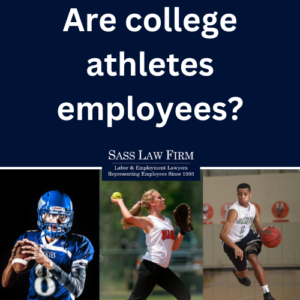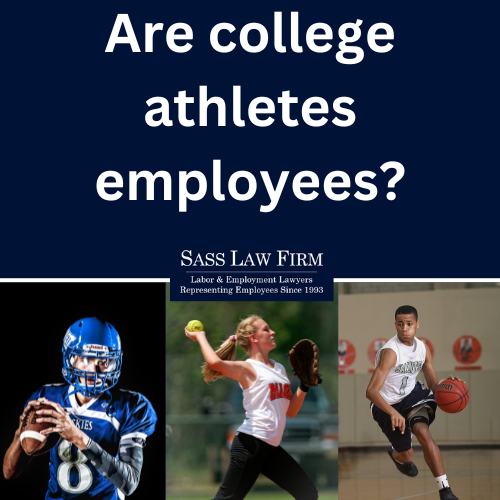 In December 2022, the Los Angeles Regional Office of the National Labor Relations Board (NLRB) found collegiate football and basketball players at the University of Southern California (USC) to be employees, and as such, have protection under the National Labor Relations Act (NLRA). Specifically, the NLRB pursued a charge against USC, the PAC-12, and the NCAA claiming the college athletes’ ability to negotiate for compensation or their ability to collectively bargain making them employees.
In December 2022, the Los Angeles Regional Office of the National Labor Relations Board (NLRB) found collegiate football and basketball players at the University of Southern California (USC) to be employees, and as such, have protection under the National Labor Relations Act (NLRA). Specifically, the NLRB pursued a charge against USC, the PAC-12, and the NCAA claiming the college athletes’ ability to negotiate for compensation or their ability to collectively bargain making them employees.
The NLRB decision follows the NLRB General Counsel’s 2021 memorandum arguing that college athletes should be classified as “employees” under the NLRA’s broad definition of an employee after a decades-long discussion in the courts regarding amateurism in collegiate athletics. Even though student athletes historically were not employees under the labor and employment laws, there is precedent that certain types of students may be employees, like graduate student instructors. Given this legal landscape, it can be difficult to determine when a collegiate athlete is a student or an employee.
Student or employee?
Whether a college athlete is an employee depends on a variety of factors, including the particular facts of the situation, what sport is played, as well as what law applies. For example, under the NLRA, at least one regional office of the NLRB initially classified collegiate athletes who play football and basketball as employees. But that case is on review and no final decision of the Board has yet been made. In addition, it is unclear whether this initial employment classification under the NLRA extends to athletes in nonrevenue generating sports or to divisions or conferences where student/collegiate athletes receive no form of compensation like scholarships.
Are college athletes entitled to minimum wage and/or overtime when participating in college athletics?
Some student/collegiate athletes argued that they are entitled to minimum wage for participating in collegiate athletics. Unfortunately, a federal appellate court rejected this argument in Berger v. NCAA, 843 F.3d 285 (7th Cir. 2016). However, the issue remains unresolved in other courts.
What other laws may apply if a college athlete is an employee?
- Title VII of the Civil Rights Act of 1964, as amended, prohibits discrimination based on race, sex (including pregnancy, sexual orientation, gender identity), color, national origin and religion. To consider whether a college athlete is protected by Title VII, the courts will consider whether the athlete is being compensated; whether they receive benefits; and whether the adverse action was taken for an academic reason. This is not an exhaustive list, and one factor does not weigh more heavily in the analysis than another. Notably, each case depends on its own particular facts and circumstances.
- State anti-discrimination laws, theoretically. While we are unaware of any college athlete cases under the Florida Civil Rights Act, since it is patterned after Title VII, the FCRA may also provide similar protections from race, sex, color, national origin, religion, pregnancy, marital status and age discrimination to college athletes who are deemed employees.
- If Title VII (or the state law) does not apply to a college athlete, then they have protections under Title IX of the Education Amendments of 1972 (Title IX). Title IX is another anti-discrimination law that prohibits gender discrimination at colleges and universities that accept federal funds. Title IX’s prohibition against gender discrimination includes but is not limited to equity in athletics, pregnancy discrimination, and sexual harassment. These cases are investigated by the Office of Civil Rights, the federal agency that enforces anti-discrimination laws in education (like Title IX).
- The Americans with Disabilities Act of 1990, prohibits disability discrimination in the workplace as well as requires reasonable accommodations for qualified individuals with disabilities, absent an undue burden.
- The Rehabilitation Act of 1973, Section 504, also prohibits disability discrimination and requires workplace accommodations to employees with disabilities.
- Florida Educational Equity Act, prohibits discrimination against students and employees in the state system of public K-20 education based on race, color, national origin, sex, disability, religion, or marital status.
- Federal and state whistleblower laws may also apply.
However, before pursuing a claim under these statutes, student/collegiate athletes should consult with an attorney before bringing their claims because there could be implications regarding the athlete’s status in other areas apart from a discrimination claim.
Note an employee potentially can have claims under both Title VII and Title IX. However, the courts are split as to whether employees, other than those claiming retaliation (based on the underlying complaint of student gender discrimination), have claims under Title IX.
Does it matter if the student is a college athlete in an NCAA school?
If a college athlete attends an NCAA school, they should consider potential NCAA eligibility requirements when balanced against potential violations of the law and potential challenges to existing law. For example, one Supreme Court Justice questioned whether the NCAA compensation model may be outdated in terms of the athletic amateurism debate, whether it has a discriminatory effect on African American collegiate athletes, and whether the model potentially violates provisions of the antitrust laws regarding restraints on trade, competition, etcetera.
Whether a college athlete is considered also an employee is a complex analysis. If you are a college athlete and have questions or concerns about your “employee” status, it is imperative that you consult with attorneys experienced in education and employment law issues, like those at Sass Law Firm. Don’t delay because your legal claims under Title VII and/or Title IX are subject to strict time deadlines.

